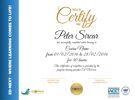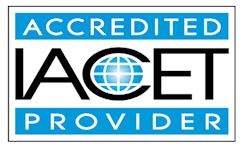Worker's Compensation: A Field Guide for Employers
Ed-Next
Summary
- Exam(s) / assessment(s) is included in price
Overview
Workers' Compensation: A Field Guide for Employers covers all the topics a student needs to know to understand Workers Compensation insurance, including how to reduce premium costs. Topics covered include how Workers' Compensation insurance is priced and audited. This course explains the classification system used by insurance companies, the audit process, experience modification factors, and how and why overcharges occur. Most importantly, it explains in plain language to students how employers can protect themselves from the common mistakes the insurance industry makes that cause Workers' Compensation premiums to be higher.
Course media
Description
After completing this course, you should be able to:
- Identify the various types of workers’ compensation policies
- Recall the classification system and it’s common code mistakes
- Recognize how to choose the right type of agent, insurer, consultant, and coverage
- Identify elements of the workers’ compensation market
Workers' Compensation: A Field Guide for Employers Module 1
The "Big Picture" State-By-State and Workers' Compensation Policy and Premiums
- Workers’ Compensation is, primarily, an obligation imposed upon employers by state statutes. A standard Workers’ Compensation insurance policy is a unique contract in many respects.
- Benefits, Coverage, and Rules Governing Premiums
- Understanding Your Policy
- Different Kinds of Workers' Compensation Policies
- The Employer's Duty Under the Policy
- Understanding How Premiums Are Calculated
Workers' Compensation: A Field Guide for Employers Module 2
Classifications and Audits
- The classifications that are assigned to a business can significantly affect how much premium the company pays every year for their Workers Compensation premium.
- The Classification System
- Common Classification Code Mistakes
- The Experience Modification Factor
- Prepare for Your Audit
- Common Audit Mistakes
Workers' Compensation: A Field Guide for Employers Module 3
Finding the Best Agent and Insurance
In addition to finding Workers' Compensation insurance and what needs to be done when a policy ends and the audit is being done. During those two events, there are many important steps that employers also need to take to control their Workers' Compensation costs and make sure their coverage is right.
- Choosing the Type of Agent
- Choosing Insurers and Consultants
- Managing Workers' Compensation Costs Between Renewals
- Alternative Approaches to Traditional Insurance
- Finding the Right Coverage
Workers' Compensation: A Field Guide for Employers Module 4
Alternative Approaches, Employers and Strategy
The pressures created by the costs of Workers' Compensation coverage have made new developments come along much more rapidly. The Workers' Compensation market poses some unique problems for employers of different sizes and types.
- New Developments in Workers' Compensation
- Alternative Approaches to Claims and Safety
- Tips for Large Employers
- Tips for Small Employers
- Different Employers, Different Strategies
Ed4Online has been approved as an Accredited Provider by the International Association for Continuing Education and Training (IACET). In obtaining this accreditation, Ed4Online has demonstrated that it complies with the ANSI/IACET Standard which is recognized internationally as a standard of good practice. As a result of the Accredited Provider status, Ed4Online is authorized to offer IACET CEUs for courses and programs that qualify under the ANSI/IACET Standard.
You will earn 2.4 IACET continuing education credits by completing this Ed4Online course. This course is 24 contact hours which equals 2.4 CEUs based on the IACET standard. The International Association of Continuing Education and Training is the highest quality worldwide standard for Continuing Education Unit.
The Continuing Education Unit (CEU) was created by IACET as a measurement of continuing education. One (1) IACET CEU is equal to ten (10) contact hours of participation in an organized continuing education experience under responsible sponsorship, capable direction, and qualified instruction. Under IACET's care, the IACET CEU has evolved from a quantitative measure to a hallmark of quality training and instruction.
Who is this course for?
Anyone interested in HR Management and leadership
Requirements
No prior qualification required
Career path
Application of principles learnt in this course
Reviews
Currently there are no reviews for this course. Be the first to leave a review.
Legal information
This course is advertised on reed.co.uk by the Course Provider, whose terms and conditions apply. Purchases are made directly from the Course Provider, and as such, content and materials are supplied by the Course Provider directly. Reed is acting as agent and not reseller in relation to this course. Reed's only responsibility is to facilitate your payment for the course. It is your responsibility to review and agree to the Course Provider's terms and conditions and satisfy yourself as to the suitability of the course you intend to purchase. Reed will not have any responsibility for the content of the course and/or associated materials.



